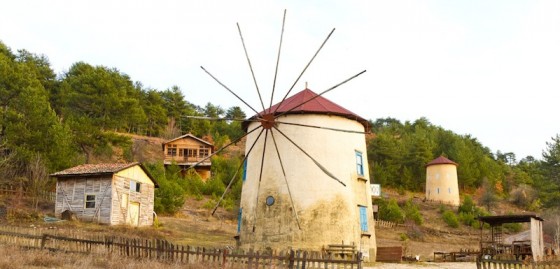 Virgin wilderness on Turkey’s western coast is threatened by the construction of new wind infrastructure. Above, an image of a traditional Turkish windmill.
Virgin wilderness on Turkey’s western coast is threatened by the construction of new wind infrastructure. Above, an image of a traditional Turkish windmill.
An organic farmer near İzmir in western Turkey awoke a few weeks ago to the sound of poles and transmission lines being installed on a hill near his farm. The lines will connect new wind energy projects in Çeşme to the city of İzmir, but pose a serious threat to future farming activity in the region, according to the farmer. The twist: this organic farmer is also the manager of one of Turkey’s first wind energy project developers.
A haven of organic farming
Because of his prominence in the sector, the organic farmer and wind energy company manager didn’t want his name published. But he explained the situation to Green Prophet in an exclusive interview. We’ll call him Rüzgar (“wind” in Turkish, also sometimes used as a first name for men) for the purposes of this article.
“The channel which the line is passing through is the only region conducting organic farming activities such as ours,” Rüzgar says. “I just want to show the paradox of how these wind power plant activities — which we are deeply involved in — are destroying our organic farming activities.”
The forests around his farm have a special “first degree protected area” status, according to Rüzgar, who has been living on his 150,000-square-meter CERES-certified organic farm with his family since 2000. They focus on raising organic olives and related products, but also belong to a small group that works on joint organic projects.
Transmission company violating “common rules and criteria”
The Turkish Electricity Transmission Company (TEİAŞ) has ignored the protected status of the land, and hasn’t conducted a proper environmental impact assessment of the transmission project, according to Rüzgar.
“The rules and criteria for wind farming project development are totally common rules and criteria. Protection of the environment is essential for wind farming activities. Green electricity production must consider the environmental effects of the farm,” he says.
The lines have an electric potential of 380 kilovolts, meaning their presence may have unknown electromagnetic effects on the surrounding area. A study of how the lines will specifically affect organic farms in the region is forthcoming, according to Rüzgar.
He doesn’t want to get involved in a legal battle with TEİAŞ because of his position in the sector, but Rüzgar says that a neighboring village, Bademler, is preparing to take the transmission company to court over the construction.
Wind energy in Turkey: A troubled history
We’ve reported before on the issues that have beset Turkey’s wind energy industry, including the fact that bringing turbines out to wind farms requires the construction of new access roads that must often cut through remote wilderness areas.
In 2008, a poorly planned auction of tenders for wind farm licenses awarded overlapping tenders to multiple bidders, forcing the results of the auction to be untangled and redone, a process that is still not quite finished.
But the government also seems very serious about improving Turkey’s wind energy capacity rapidly, announcing an ambitious “National Wind Energy System” last year.
Hopefully, Turkey’s wind energy sector will continue to expand without hurting other fragile environmental movements in the country. Organic farmers, especially, need all the support they can get in Turkey, which has some of the most pesticide-laden fruits and vegetables in Europe.
Read more about wind energy in Turkey:
Tektug Elektrik Group Enters Turkey’s Expanding Wind Energy Sector
Local Wind Energy Industry Emerges In Turkey
Hidden Costs of Constructing Wind Farms in Turkey Include Many New Roads
Image of traditional Turkish windmill from Shutterstock


